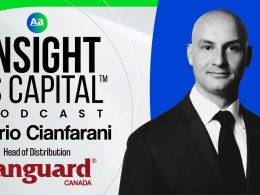by Wayne Badorf, CFP, CFS, Wells Fargo Asset Management
Dr. Brian Jacobsen helps your clients read the Brexit situation and position portfolios for opportunity.
Wayne Badorf: This week Dr. Brian Jacobsen helps your clients understand the Brexit situation and position portfolios to seek opportunity. I’m Wayne Badorf.
Jon Lagerstedt: And I’m Jon Lagerstedt.
Wayne: And this is The Essential Practice. Brian, welcome to the program.
Dr. Brian Jacobsen: Thanks for having me back.
Wayne: As our listeners know, you are chief portfolio strategist with Wells Fargo Asset Management. I do want to inform the audience about the special Brexit edition of On the Trading Desk, which you hosted last week, Brian, called, “Brexit: The Vote Felt Around the World,” where you spoke with four [Wells Capital Management] portfolio managers—Dale Winner who manages equities globally; both Peter Wilson and Ashok Bhatia who have their eyes on global fixed income; and Margie Patel who, as a high-yield fixed-income PM, has her arms firmly around U.S. equities—to learn how they prepared for such an event and are looking for opportunities.
Brian: Yes. It was a very fascinating and exciting conversation with all of them—thought the discussion was particularly helpful for clients. None of the portfolio managers seemed surprised, even though they may have been by the outcome of the Brexit vote. Each had very specific views on the event and they saw specific opportunities. So I’d invite The Essential Practice audience to come on over and listen if they haven’t—especially if an advisor has assets with any of these portfolio managers. We call it On the Trading Desk because we want to get you as close to the decision-makers as possible.
Jon: Very good, Brian. Here we are about two weeks out since the Brexit vote. And the story is still unfolding. So let’s start with your thoughts on anything of note that might move the markets in either direction.
Brian: Yeah, you know, I think we almost immediately went into what I’d call peak uncertainty. That’s the immediate sell-off in the markets. But riskier assets, generally speaking, have recovered and I think that’s because we’ve passed that peak uncertainty. But now we have a number of hurdles that we need to clear. So I think you’re going to see pockets of volatility, but then in between I think you will continue to see markets generally recover because I don’t think the economic fallout is going to be nearly as bad as what’s priced into the markets—which keeps me constructive on investing in risky assets.
Jon: Interesting.
Wayne: Well let’s talk about that for a moment. Thinking about portfolio positioning, you talked about pockets of volatility but a market recovery as well. How does an advisor connect this information for how they might be constructing portfolios for their clients? Let’s start with fixed income.
Brian: I think in the fixed-income space you really need to be more strategic in allocations here—perhaps tactical on the fringes. So, strategic in the sense that you want to make sure that your fixed-income allocation still makes sense for your client. And include within that fixed-income allocation the cash the client might be sitting in—that’s yielding 0% if not a negative percent if you adjust it for inflation. Right? If you have positive inflation, like we do have in the United States—it’s not very high, but, that’s still eroding away the purchasing power of that money.
And so on the fixed-income side take on a little more credit risk where you’re at least beating this bogey. And there are plenty of opportunities in the short-term high-yield space. Even if that cash is being in parts of the market that you want to reallocate in the future. And that’s where those adjustments come into play. So, tactically I think you want to go with a portfolio manager that can play these opportunities in the market, taking on that credit risk, maybe looking for different mispricings, but you have to play that more opportunistically.
Wayne: Great! So now let’s turn to the equity side for positioning clients.
Brian: I think positioning in the equity space means being in constant communication with clients about the purpose of the equity exposure. You are not in equities for stability purposes.
Jon: Excellent point.
Brian: I see a lot of opportunity still in international equities, whether that’s in developed or emerging markets. Emerging markets have held up quite reasonably throughout this Brexit turmoil. They did indeed sell off. Yes, they dipped. But that creates some good valuation opportunities. And then in the developed world [in Britain], keep in mind that nothing has fundamentally changed. None of the rules have been rewritten yet. And as a result, the economic fallout really shouldn’t be all that bad. It means being able to take advantage of opportunities as they present themselves. And that, I think, means working with an experienced portfolio management team where they’ve been through a few of these cycles before and that they can keep calm and keep investing no matter what the economic or political environment throws at us.
Jon: Brian, we have just enough time for maybe a key takeaway for financial advisors joining us today.
Brian: Yeah, I think the real key takeaway now is probably the opportunity to stay calm and look for those investment opportunities because those opportunities can be pretty fleeting.
Wayne: Well, Brian, on behalf of Jon and myself, thanks again for helping advisors to connect clients to the capital markets.
Brian: My pleasure, thank you.
Wayne: That’s all we have for this week. Until next time, I’m Wayne Badorf.
Jon: And I’m Jon Lagerstedt.
Wayne: And this is The Essential Practice.
















